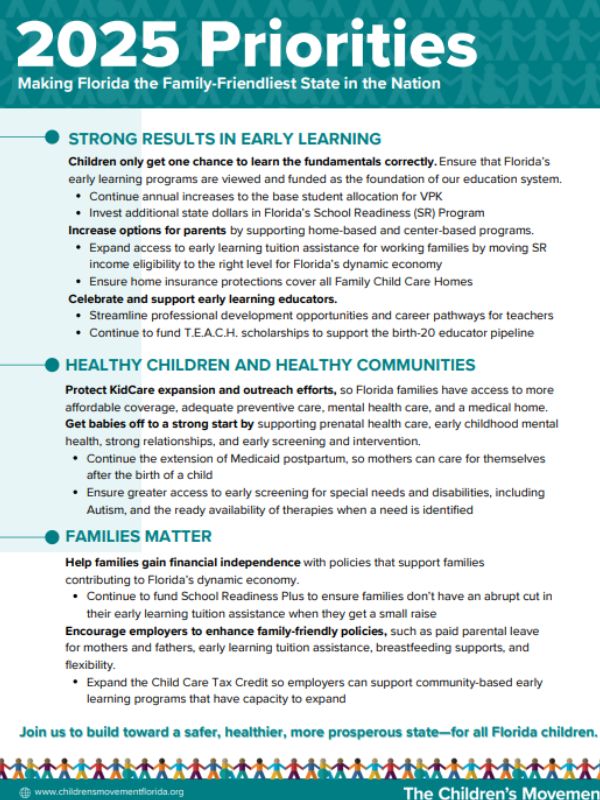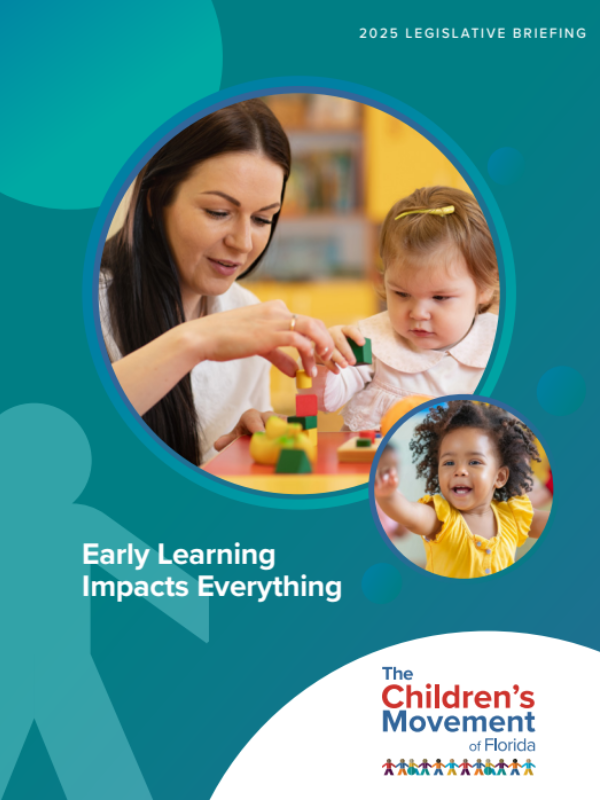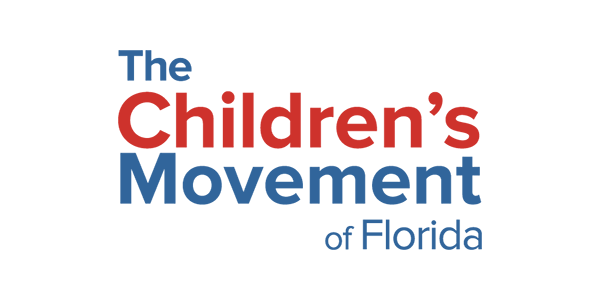Updates from the 2025 Session
This was an especially long legislative session, with budget negotiations extending the close of session from May 2 to June 16. A few key early childhood-related bills did pass, though the budget did not favor early learning this year.
Top Bills We Followed
HB 877/SB 1102: School Readiness Program
- Why we followed this bill: It sought to make it easier for early learning programs to access special needs differential funding through School Readiness (SR), Florida’s early learning tuition assistance program. It also required programs to complete 10 hours of training in inclusive practices to be able to serve children with special needs and receive the bonus dollars, as a quality assurance that the programs can serve all children in their program well. It also made it easier for students to validate necessary accommodations, allowing for a licensed health care or mental health professional, or an educational psychologist, to confirm their disability accommodations in either an IFSP (Individualized Family Support Plan) or IEP (Individualized Education Plan).
- What happened: The House version, sponsored by Reps. Dana Trabulsy and Robin Bartleman, made it through all committees and was replaced with the Senate version, sponsored by Sen. Alexis Calatayud, which passed through all its own committees as well as a Senate floor vote.
- Where you can find parts of it now: You can read the full text of SB 1102, now the law in Florida, here.
HB 859: School Readiness Program/SB 1382: Access to School Readiness Program for Economically Disadvantaged Households
- Why we followed this bill: It sought to reset eligibility for the School Readiness program, aligning income to a percentage of Florida’s State Median Income (SMI), as opposed to the Federal Poverty Level (FPL). With a rising minimum wage in our state, the SMI is growing at a faster rate and this would help preserve access for families who rely on this tuition assistance to have an early learning opportunity. It also required early learning funding to be calculated including information on SR enrollment and population, and instituted a new uniform waitlist, factoring in household income, that would help inform future need for early learning tuition assistance.
- What happened: The House version, sponsored by Rep. Chase Tramont, made it through all committees and was replaced with the Senate version, sponsored by Sen. Alexis Calatayud, which passed through all its own committees, but then was rolled into the House Education package, HB 1255.
- Where you can find parts of it now: You can read the full text of HB 1255, now the law in Florida, here. Refer to pages 44-49 for revisions to Florida Statute 1002.81 regarding SR eligibility criteria, 1002.82 to align priority populations for SR, 1002.85 on a uniform waitlist for SR, and 1002.89 regarding the funding formula.
HB 591/SB 112: Children with Developmental Disabilities
- Why we followed this bill: A priority of Senate leadership, these bills sought to create a new Center for Autism and Neurodevelopment at the University of Florida, as well as the Early Steps Extended Option for 3-year olds with developmental delays to stay in the Early Steps early screening program until the beginning of the school year after their 4th birthday. Those who opt in to the program would then transition into school-age education with a personalized support plan outlined by their school district. They also increased grant funding for screenings, referrals, and treatment.
- What happened: Both versions of the bill passed through all of their respective committees, with the Senate version, sponsored by Sen. Gayle Harrell, passing a floor vote early in the session. The House version, sponsored by Rep. Randy Maggard, was replaced with the Senate version on the floor, where it unanimously passed. It will now be presented to the Governor for signature into law.
- Where you can find parts of it now: The full text of SB 112 can be found here.
HB 47/SB 738: Child Care and Early Learning Providers
- Why we followed this bill: These bills sought to streamline hiring and training procedures, as well as child care regulation, to allow for more professionals and children to enter the system. These changes included the creation of a provisional background screening, and three tiers of DCF license violations. Additionally, they created a new license class for “large family child care homes” and extended current property insurance protections for family child care homes to them. The House version also updated statutory references to “family day care homes” with “family child care homes” to bring them more in line with modern conventions.
- What happened: Both versions of the bill passed through all of their respective committees, though not without significant changes. The Senate version, sponsored by Sen. Colleen Burton, lost the insurance protection provision in the committee process, while the House version maintained the insurance protections and updates to statutory language. The Senate version passed a floor vote, while the House version, sponsored by Rep. Fiona McFarland, was replaced with the Senate version for its floor vote, thus losing the insurance protections and statutory language changes. That version passed the House floor and was signed by the Governor into law.
- Where you can find parts of it now: The full text of SB 738 can be found here.
HB 61/SB 72: Use of Campaign Funds for Child Care Expenses
- Why we followed this bill: These bills sought to allow candidates for public office to use campaign funds for child care expenses they incur while campaigning for office, amending existing statute allowing funds to be used on family expenses. The funds would only be authorized for expenses incurred by campaign activities, like canvassing, not personal errands or routine childcare. All records and receipts would need to be preserved for three years and included in financial reporting.
- What happened: The Senate version, sponsored by Sen. Lori Berman, made it through two committees before dying in Rules, its final committee. Its House companion, sponsored by Reps. Kelly Skidmore and Fiona McFarland, was not taken up by any committees it was referred to and thus not voted on.
Early Learning Budget Highlights
- $1.6 billion for early childhood education, which funds SR and VPK, representing a reduction of 5.7% from FY 2024-2025.
- $434.2 million for VPK, a .9% decrease from FY 2024-2025.
- $1.1 billion allocated to SR, a 6.7% decrease from FY 2024-2025.
- Carry forward of non-recurring funds for the School Readiness Plus Program, FY 2024-2025
- Maintained $2.8 million for Summer Bridge VPK Program
About Florida's Legislative Session
The 2025 Florida Legislative Session officially began on Tuesday, March 4, and was set to end on Friday, May 2. After being extended due to budgetary negotiations, it completed on June 16. In the months before the session began this fall, elected officials began laying the groundwork for the 60-day session during their committee weeks.
House and Senate Leadership
Speaker Daniel Perez (R-Miami) and President Ben Albritton (R-Bartow) were elected by their peers to lead the House and Senate last year, respectively, for this and the next session. Both Speaker Perez and President Albritton gave brief remarks about the importance of early childhood in their upcoming leadership terms at our Built to Thrive Summit this past September.
Below are some key leaders in the House who had a say in early childhood issues. You can click on each committee to see if your own elected leaders served on these committees, too.
- Chair Lawrence McClure (R-Dover), Budget Committee
- Chair Jenna Persons-Mulicka (R-Fort Myers), PreK-12 Budget Subcommittee
- Chair Jennifer Canady (R-Lakeland), Education & Employment Committee
- Chair Alex Rizo (R-Miami), Student Academic Success Subcommittee
- Chair Dana Trabulsy (R-Fort Pierce), Education Administration Subcommittee
- Chair Josie Tomkow (R-Polk City), Health & Human Services Committee
- Chair Adam Anderson (R-Palm Harbor), Health Care Facilities & Systems Subcommittee
- Chair Sam Garrison (R-Fleming Island), Rules & Ethics Committee
And in the Senate:
- Chair Ed Hooper (R-Palm Harbor), Committee on Appropriations
- Chair Danny Burgess (R-Zephyrhills), Appropriations Committee on PreK-12 Education
- Chair Jay Trumbull (R-Panama City), Appropriations Committee on Health and Human Services
- Chair Corey Simon (R-Tallahassee), Committee on Education PreK-12
- Chair Colleen Burton (R-Winter Haven), Committee on Health Policy
- Chair Erin Grall (R-Fort Pierce), Committee on Children, Families, and Elder Affairs
- Chair Kathleen Passidomo (R-Naples), Committee on Rules
Committee Weeks
In order to prepare for the upcoming session, these House and Senate committees met a number of times in the weeks leading up to session. Committee weeks began December 2, 2024, and ended February 21, 2025.
Lawmakers used these committee weeks to get information from state leaders, hear from experts on the issues they may address, and workshop proposed bills.
Regular Session: March 4 to May 2
Yesterday marked the opening of Florida’s 127th Regular Legislative Session. On Tuesday, March 4, Senate President Ben Albritton (R-Wauchula) and Speaker of the House Daniel Perez (R-Miami), offered remarks in their respective chambers, and Governor DeSantis gave his "State of the State" address to a joint House and Senate session.
Speaker Perez encouraged legislators to rise to the challenge of improving conditions for children and families, stating that “as great a place as Florida is to live, work, raise a family, and send our kids to school, we can always do better. We can be better.” He also emphasized his commitment to the legislative process, imploring colleagues to focus on collaboration on good policy over personal priorities, stating that “No one has a monopoly on good ideas, and when a bill reaches the Floor of this House, it should be the best version of itself – poked, prodded, tested, and shaped by your input and engagement.”
President Albritton highlighted Senate legislation focused on early detection and support for children with autism, child welfare, and mental health. He stated that the Senate will be “laser-focused” on solving food insecurity, saying, “I struggle with the fact that kids in Florida are going to bed night after night, hungry. We can and will do better than that.” He also laid out his legislative priorities regarding rural and agricultural revitalization, addressing inflation and the cost of living, and improving the state’s technological infrastructure.
Following the remarks in the joint session, Democratic leaders Rep. Fentrice Driskell and Sen. Jason Pizzo shared their priorities, with a focus on "kitchen table issues,” giving Floridians a “fair shot” at the American dream, and prioritizing bipartisan solutions over rhetoric.
Any bill that may pass during the 60-day session was filed before the session began. The first half of the session was spent workshopping and passing bills through the committee process, while the second half of the session was more focused on budget negotiations between the House and Senate, and meetings on the floor to pass legislation. Those negotiations did not conclude by the May 2 deadline, resulting in the session being extended until June 16.
Extended Session
Senate leadership extended the session until June 16, returning after Memorial Day to hammer out a $4 billion budget gap separating the House and Senate versions, resulting in a $117.4 billion Budget for Fiscal Year 2025-2026.
Looking Ahead
The 2026 Legislative Session will begin on January 13th, with committee meetings taking place:
- October 6-10
- October 13-17
- November 3-7
- November 17-21
- December 1-5
- December 8-12
Updates
Throughout each legislative session, we send weekly updates on early childhood bills filed and moving (or not) through the process. Sign up for our newsletter to receive these updates.
Resources


The Children's Movement of Florida - 2025 Early Learning Legislative Briefing
